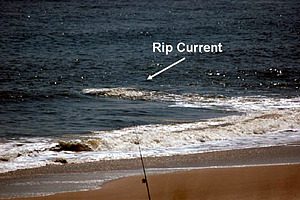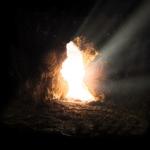
While swimming comfortably at the beach, you suddenly feel yourself being drawn away from the shore rather than toward it. You are being pulled into a deadly surprise, known as the rip current.
Nature’s Freak Show
Rip currents, as defined by the U.S. National Weather Service, are “strong, narrow, seaward flows of water that extend from close to the shoreline to outside of the surf zone.”
My family and I have lived in Florida for over a decade. We have experienced deadly dangers of living here, including alligators, sharks, hurricanes, snake bites and many others. In my opinion, one of the most deadly and unexpected of Florida’s dangers is getting caught in a rip current at the beaches. Most dangerous is that you feel you are only a few feet from safety and you instinctively try to swim to shore. But doing what seems natural envelops you in the deadly surprise.
You may think that Olympic swimmers move very fast; rip currents can move faster—reaching as much as 8 feet in a second, as reported by the National Oceanic and Atmospheric Administration. These experts contribute sobering statistics: “Lifeguards rescue tens of thousands of people from rip currents in the U.S. every year, but it is estimated that 100 people are killed by rip currents annually.” They advise, You can’t fight against it—don’t try, or you will become one of its victims.
What can you do to save your life? Ignore what your body may be trying to do. The Oceanic and Atmospheric advisors have written, “Swim parallel to the shore and swim back to land at an angle.”
Deadly Surprise in Human Nature
Human nature also has its deadly surprises. We may be blissfully enjoying ourselves when the currents of life turn in directions we are not expecting.
- Drugs may seem at first to enhance a good time at a party. But the rip current of addiction is deadly—hopelessly pulling you from safety.
- Alcohol, a vice handed down through our early ancestors, may seem less threatening—but it isn’t. They were caught up in rip-type traps still rampant in today’s world.
- Breaking God’s commandments is often dismissed with some of Satan’s favorites: “everyone is doing it,” “I won’t have friends if I don’t,” “it’s just a small thing,” “it won’t hurt anyone,” “these standards are outdated and no longer relevant.” Like rip currents, these attitudes and behaviors quickly yank you into fatal directions.
Lifeguards Chosen and Prepared
Paul warned the Ephesians (6:12), “We wrestle not against flesh and blood, but against principalities, against powers, against the rulers of the darkness of this world, against spiritual wickedness in high places.”
The enemy is quite crafty; he is the master of the deadly surprise. Some of the most dangerous things to watch out for are confusion, fear, doubt, and fatigue. In our daily spiritual lives many of these things are all that we see and experience.
Our loving God understands the currents of our oceans and the currents of our life challenges. He has chosen and prepared lifeguards to teach us of dangers and help us get through them—to bring us to His safety and peace. We may think of our prophets as spiritual lifeguards; they are our lifeline on earth today. Despite our specific needs and challenges, they know what to do for us—He has trained them and He tells them.
“With a prophet, sometimes it only takes a moment to know . . . to trust the counsel of a living prophet, even if we do not fully understand it,” wrote Elder Allan D. Hayne, as he shared his personal experience.
A perfect and loving Father in Heaven has chosen the pattern of revealing truth to His children through a prophet . . . A prophet is someone God has personally prepared, called, corrected, inspired, rebuked, sanctified, and sustained. That is why we are never spiritually at risk in following prophetic counsel.
When Elder Hayne walked into the cafeteria in the Church Office Building, he walked past a table occupied by President Nelson and his two counselors—with an empty chair. As he walked past, they called to him to join them. After a very pleasant lunch, they rose to leave, and President Nelson flattened his water bottle. When Elder Hayne asked about it, Elder Oaks remarked, “Well Allan, you need to follow the prophet.”
In a general conference talk, Elder Quentin L. Cook was more serious and doctrinal but just as sincere, explaining that prophets are “commissioned agents of the Lord, authorized to speak for Him . . . [and that] some revelations are of monumental importance, and others enhance our understanding of essential divine truths and provide guidance for our day.” What better lifesaving could we ask.
As our primary children sing,
Follow the prophet, follow the prophet,
Follow the Prophet; don’t go astray.
Follow the prophet, follow the prophet,
Follow the prophet; he knows the way.
The song introduces specific prophets who have saved their people: Adam, Enoch, Noah, Abraham, Moses, Samuel, Jonah, and Daniel. We can easily relate to the song’s conclusion:
Now we have a world where people are confused.
If you don’t believe it, go and watch the news.
We can get direction all along our way.
If we heed the prophets—follow what they say.
May we join our brothers and sisters worldwide in following our lifesaving prophets as they bring us our Savior’s protection, guidance and blessings.













